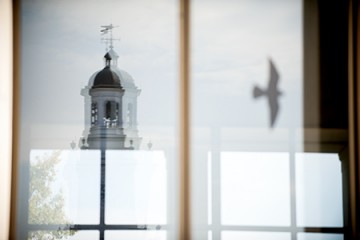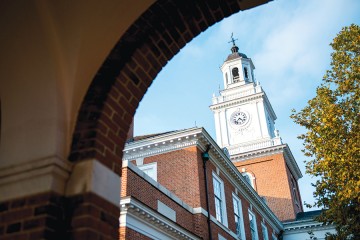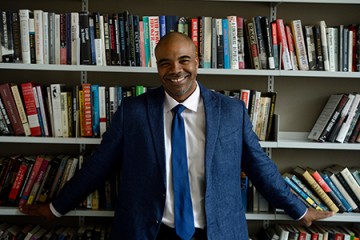In an email message sent late Saturday in response to an immigration ban enacted by President Donald Trump, Johns Hopkins University leaders said they were closely monitoring the situation and emphasized "the value we place on allowing students, scholars, and researchers from all countries to conduct their work here with us."
The message came one day after Trump issued an executive order blocking entry to the U.S. by individuals from seven countries—Iran, Iraq, Libya, Somalia, Sudan, Syria, and Yemen.
In their email, JHU President Ronald J. Daniels and Provost Sunil Kumar wrote that they have no knowledge of members of the Johns Hopkins community being blocked from entering the U.S. But they also acknowledged that some people expected to arrive at or visit Johns Hopkins in the next few months could be affected.
The full text of their message is below.
Dear Students, Faculty, and Staff:
The university is closely monitoring the immigration actions taken yesterday by President Trump, including an order that blocks entry into the United States (with very narrow exceptions) of individuals from seven nations—Iran, Iraq, Libya, Somalia, Sudan, Syria, and Yemen—for 90 days. The order also immediately suspends, for 120 days, the U.S. Refugee Admissions Program (USRAP), during which time refugees will not be admitted to the United States.
The implications of the order are not yet fully clear, and it is already being challenged in federal court with the potential for delay of the order pending judicial review. It does appear to affect those with valid visas, including a number of our students, scholars, and employees. We are tracking these developments closely and will be in close communication with affected members of our community in the coming days and weeks.
What we know today
Thus far, we have no reports that any members of the Johns Hopkins community who are citizens of the affected countries have been blocked from re-entering the United States. However, some individuals expected to arrive at Johns Hopkins within the next 90 days, and some individuals whom our departments or units planned to invite to Johns Hopkins during this period may be affected. The university's Office of International Services is working to provide support and answer questions as needed.
We also are following reports from other universities that members of their communities have been blocked from entering or re-entering the United States as a result of President Trump's order. For that reason, until we receive more information about the scope of the president's order, we strongly advise any Johns Hopkins-affiliated student or scholar who may be affected not to travel outside the United States. We encourage any member of our community to contact an OIS advisor for guidance on their individual circumstances.
In the coming days, OIS will hold information sessions for affected or concerned students, faculty, researchers, and staff. There will be sessions in East Baltimore, Harbor East, Homewood, the Peabody Institute, and Washington, D.C. Hours and locations will be posted on the OIS website. You may also reach the OIS staff at ois@jhu.edu with any information or questions.
Our commitment
Johns Hopkins University is unequivocally committed to supporting students, faculty, and staff affected by the executive order. These members of our university community are important to our academic family and to our mission of education, discovery, and service.
The Association of American Universities, of which Johns Hopkins is a founding member, today issued a statement, which the university fully endorses. We also will work closely with other universities, our elected representatives, and interested parties to address this executive order and to make clear the value we place on allowing students, scholars, and researchers from all countries to conduct their work here with us.
Sincerely,
Ronald J. Daniels
PresidentSunil Kumar
Provost and Senior Vice President for Academic Affairs
Posted in University News
Tagged president ron daniels, immigration, donald trump










